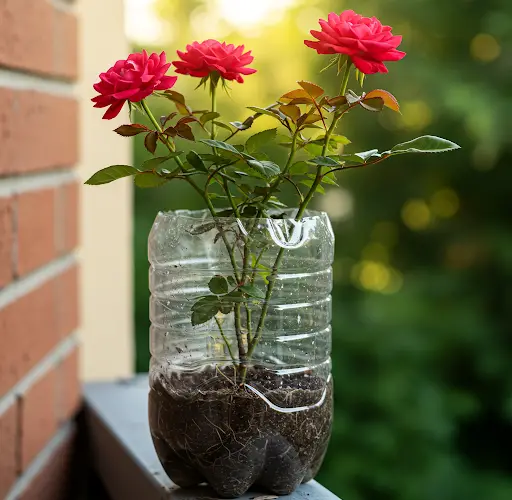How to Save Rose Plants Using Homemade Compost from Kitchen Waste | Essential Rose Care Tips
Roses are among the most cherished flowers in gardens worldwide, admired for their beauty, fragrance, and variety. However, maintaining healthy rose plants can sometimes be challenging, especially when dealing with poor soil quality, weak growth, or lackluster blooms. One of the best ways to nourish and revitalize your rose plants is by using homemade compost made from kitchen waste. Not only is this an eco-friendly solution, but it also provides essential nutrients to help roses thrive. If only I had known these composting tips earlier, I could have enjoyed even more vibrant and healthy roses!
This guide will show you how to create homemade compost using kitchen scraps and how to apply it effectively to your rose plants for optimal growth and health.
Why Compost is Essential for Rose Plants
Compost is a natural fertilizer that enriches the soil, improves drainage, and enhances the overall health of plants. When made from kitchen waste, compost becomes an affordable and sustainable way to provide your roses with vital nutrients such as nitrogen, phosphorus, and potassium.
Benefits of Using Homemade Compost for Roses:
- Improves Soil Structure: Enhances aeration and retains moisture, preventing soil compaction.
- Provides Essential Nutrients: Supplies organic matter and minerals necessary for healthy growth.
- Encourages Beneficial Microorganisms: Supports soil microbes that help break down organic material and release nutrients.
- Reduces Waste: Turns kitchen scraps into valuable plant food instead of sending them to landfills.
- Enhances Flowering: Promotes bigger, brighter, and more fragrant blooms.
How to Make Homemade Compost from Kitchen Waste
Creating compost from kitchen waste is simple and requires only a few basic materials. Follow these steps to make nutrient-rich compost for your roses.
Materials Needed:
- A compost bin or pile
- Kitchen scraps (vegetable peels, fruit scraps, coffee grounds, eggshells, etc.)
- Brown materials (dry leaves, shredded newspaper, cardboard, etc.)
- A garden fork or shovel for turning the compost
- Water (as needed to maintain moisture levels)
Step-by-Step Process:
- Select a Composting Method: Choose between a compost bin, pile, or tumbler, depending on your space and convenience.
- Layer Your Materials: Start with brown materials (dry leaves, newspaper) as a base to allow airflow. Add kitchen scraps in layers.
- Maintain a Balance: A good compost pile consists of approximately 3 parts brown materials to 1 part green materials (kitchen waste).
- Turn the Compost Regularly: Use a shovel or garden fork to aerate the pile every 7-10 days to speed up decomposition.
- Monitor Moisture Levels: The compost should be damp, like a wrung-out sponge. Add water if it’s too dry or dry materials if it’s too wet.
- Wait for Decomposition: Depending on conditions, compost will be ready in 2-4 months when it becomes dark, crumbly, and earthy-smelling.
Best Kitchen Waste for Rose Compost
Not all kitchen waste is suitable for composting. Here are the best materials to use:
✅ Good for Composting:
- Vegetable peels (carrots, potatoes, cucumbers, etc.)
- Fruit scraps (banana peels, apple cores, citrus peels in moderation)
- Coffee grounds and tea leaves
- Eggshells (great for adding calcium to the soil)
- Crushed nutshells
- Cooked rice or pasta (small amounts)
❌ Avoid These in Compost:
- Meat, fish, and dairy products (attract pests and cause odor)
- Oily or greasy food scraps
- Processed foods with preservatives
- Large citrus peels (can slow down decomposition)
- Diseased plant material
How to Apply Compost to Rose Plants
Once your homemade compost is ready, applying it correctly will maximize its benefits for your rose plants.
Steps for Using Compost on Roses:
- Apply as a Top Dressing: Spread a 1-2 inch layer of compost around the base of the plant, avoiding direct contact with the stem.
- Work it into the Soil: Lightly mix the compost into the top layer of soil using a hand rake or garden fork.
- Mulch Over Compost: Add a layer of mulch (straw, wood chips, or bark) to retain moisture and suppress weeds.
- Use as Compost Tea: Steep compost in water for 24-48 hours and use the nutrient-rich liquid to water roses.
- Apply Seasonally: Feed roses with compost in early spring, mid-growing season, and after flowering to maintain consistent nourishment.
Additional Rose Care Tips
Along with composting, proper care techniques ensure your roses remain strong, healthy, and bloom abundantly.
1. Proper Watering
- Water deeply once or twice a week, depending on climate conditions.
- Avoid overhead watering to prevent fungal diseases.
- Use mulch to retain moisture and reduce watering frequency.
2. Pruning for Healthy Growth
- Prune dead or weak stems in early spring before new growth appears.
- Remove faded flowers (deadheading) to encourage continuous blooming.
- Cut at a 45-degree angle above outward-facing buds to shape the plant.
3. Controlling Pests and Diseases
- Use neem oil or insecticidal soap to control aphids and spider mites.
- Prevent fungal infections by ensuring good air circulation around plants.
- Remove and dispose of infected leaves immediately to stop disease spread.
Conclusion
Using homemade compost from kitchen waste is a fantastic way to nourish and save your rose plants. Not only does it enrich the soil and promote healthy blooms, but it also reduces kitchen waste and supports an eco-friendly gardening practice. By selecting the right kitchen scraps, preparing compost properly, and applying it effectively, you can ensure your roses thrive season after season. If only I had known these composting secrets earlier, my roses could have flourished even more beautifully!
Try these methods, and soon, you’ll enjoy lush, vibrant, and fragrant roses straight from your garden!



